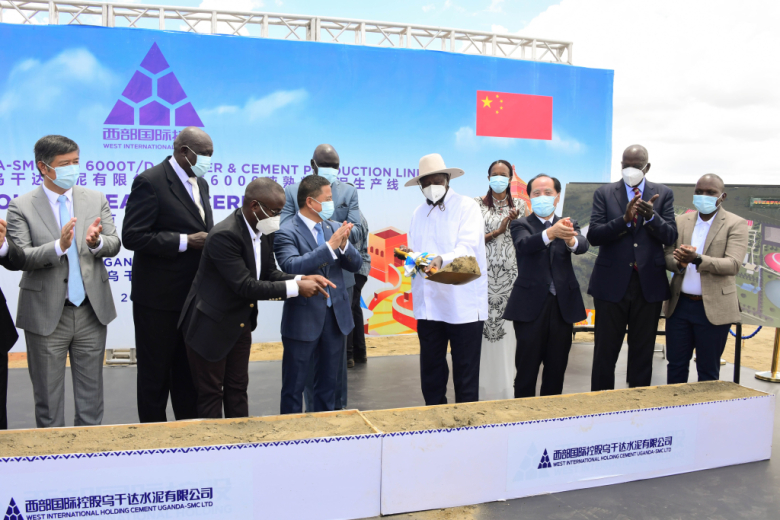
BY PPU REPORTER
President Yoweri Kaguta Museveni has said that he wants all the people in the Karamoja sub-region to benefit from the ongoing industrial development in the area.
The President made the remarks at the groundbreaking ceremony of a clinker and cement production plant in Moroto District.
“You heard that these factories which will make clinker will save Uganda 380 million US Dollars of imported clinker and they will create jobs as well as pay taxes. So, the people working in the factories will benefit, the government will also benefit through taxation.
Clinker is the backbone of cement production.
The factory is being set up by West International Holding Limited, a subsidiary of China West Cement Limited. The firm is an international group enterprise integrating cement production and marketing, corporate management, and industrial investment.
Founded in September 2019, West International Holding Limited, is committed to the investment, operation and management of cement enterprises in African and Central Asian countries, specializing in the operation and management of the cement sector.
President Museveni noted that since all the people of Karamoja cannot work in the cement factory, they can create business streams that can help them to also make money from the factory indirectly.
“All of you cannot come here to work in the factory but the workers in the factory don't come with their own gardens yet they need food, they need milk, they need beef and others, that is how all other Karimojongs can come in,” he explained.
“These factories, which are beginning to come, will gather a big population that will need to be fed so you will share the money of the factory through selling food to them. Are you willing to take that money, or do you want it to be taken by others? This is how the economy grows. I'm a cattle keeper, I sell milk in my village near Rwakitura but there they pay me between Shs600-1000 per litre but the people who are keeping cows near Kampala, they get more than Shs2000 per litre. Therefore, these factories which are coming in to bring more people together are very good for the area. Now produce food, build big hotels, build shops so that they can buy from you,” he added.
President Museveni also thanked the West International Holding Limited group for joining Uganda's journey in achieving its development agenda through industrialization.
The President was also happy to note that a good number of investors are getting to know more about Uganda as an investment destination and they are coming in to invest in the various sectors of the economy.
He also cautioned the people of Karamoja to desist from committing crime and keep peace in the area, to ensure that the industrial development agenda is achieved in the sub-region.
“Now that means you need to completely uproot those spoilers. In any case, if they don't come out peacefully, they will die. When I met the groups in Baralegi , they said these Karachunas are now staying in the wilderness so I told them that those are very easy to deal with because the government has got the eyes to see everywhere by day and night,” he said.
“For the Turkana, I told them that you will not come back to Uganda unless you hand over the people who killed my people. They are now talking of compensation, which is alright, but they must bring the killers first because we cannot go on with this nonsense. Other people are going to the moon, but we are here wasting time. For my people of Pokot, the leaders must be very firm. This game of using the fact that you have Pokot in Uganda and Kenya, and you steal cows and take them to Kenya, that should stop.”
President Museveni further pledged that the government will tarmac the roads from Moroto to Kotido and Kaabong and that from Kitgum to Kidepo.
About the electricity cost, the President told the investors that the government is working towards stabilizing the cost to 5 cents per unit.
The project will produce approximately 6000 tonnes per day of clinker. Uganda has a present cement production capacity of over 4.5 million tonnes per annum and the demand is projected to increase by 15 percent annually on the background of the booming oil and gas sector and infrastructure development.